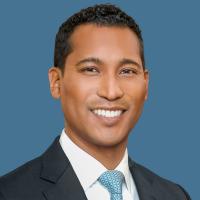Role Reversal: The Changing Face of Caregivers
WASHINGTON — The face of the United States is changing with shifting demographics and majorities. And those changes aren't solely along racial, ethnic or religious lines.
Today, men make up about 40 percent of America's 40 million caregivers — a role traditionally viewed as predominantly female.
In 2015, Jonathan Hayden, 40, of Washington, D.C., became the caregiver for his father, who was diagnosed with mild cognitive impairment that would eventually develop into a form of memory loss called Lewy body dementia.
"I tend to think that he's had signs of it for a long time. He's never been much for remembering things," he told CBN News.
Hayden represents a changing demographic among people caring for relatives. Today, men account for between 40 to 45 percent of caregivers in the U.S.
In 1996, the number was only 19 percent.
"Men are doing things like providing help with bathing, dressing, eating, as well as giving injections or helping with wound care," said Jean Accius, vice president of independent living/long-term services and support for AARP. "These are things you may not typically think about a male family caregiver would be doing."
To highlight the trend and raise awareness of the unique issues for male caregivers, AARP teamed up with the Ad Council to produce commercials depicting men taking care of their aging family members. The goal is to point men to the resources they need to care for themselves and their loved ones.
Hayden admits taking care of his father, a retired Episcopal priest, has been an emotional challenge, both in terms of his father's memory loss and dealing with his sometimes combative personality.
"My father has said some things that have hurt me to the core," Hayden recalled. "Hurt me to the core — left me [going] out of there crying."
Yet he also acknowledges how being a caregiver has helped him grow and learn about patience and forgiveness.
"We have to be patient with the person and recognize that they cannot control what it is that they're doing, and that it's not their fault," Hayden said.
"We come from a proud tradition, proud people, it's hard to give up," Hayden added, describing his father's desire to remain independent. "It's hard to let go. It's hard to say, 'Hey, pull me,' when you've been nothing but a leader and pulling everybody else."
Hayden credits his Christian faith, help from friends and neighbors, and the sense of community he receives from a support group for caregivers. There, he met a woman he started dating, bonding over their shared experiences with dementia.
That outlet, however, is something many men don't accept.
"Men tend to 'suck it up,' if you will, and take it in stride — not really looking for the help that they need," Accius noted. "That poses some potential health challenges."
Along their journey, Hayden and his father have found moments of healing from their sometimes rocky relationship.
Hayden told CBN News although being a caregiver was unexpected, it's a role he now proudly embraces.
"There's nothing feminine or less masculine about being a caretaker, being a nurse, whatever you want to call it," he observed. "You have to because they're your parents."




